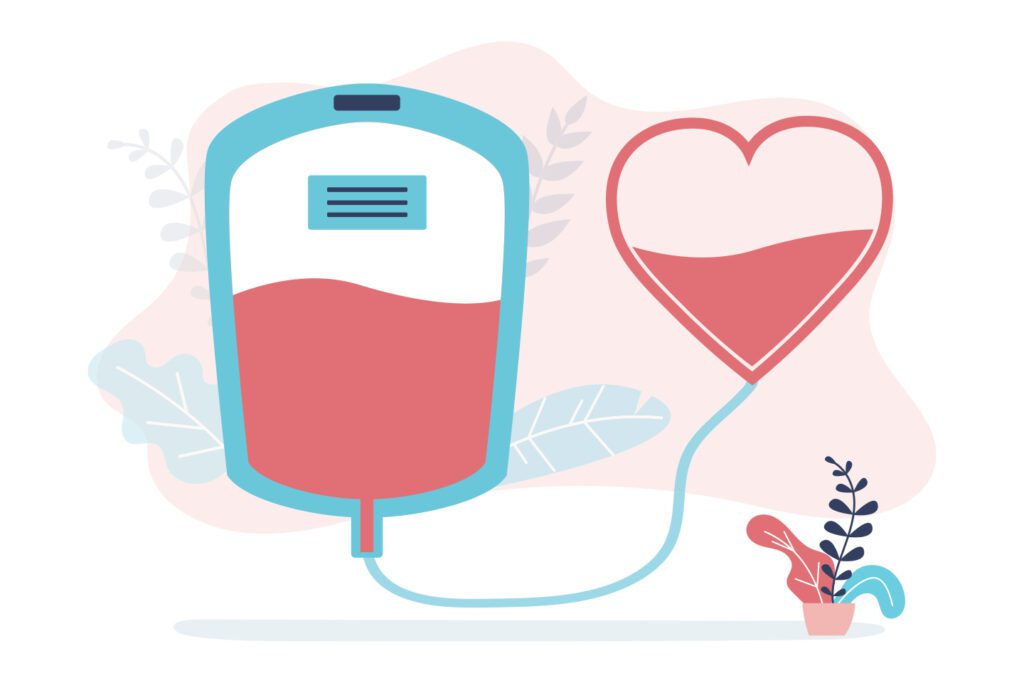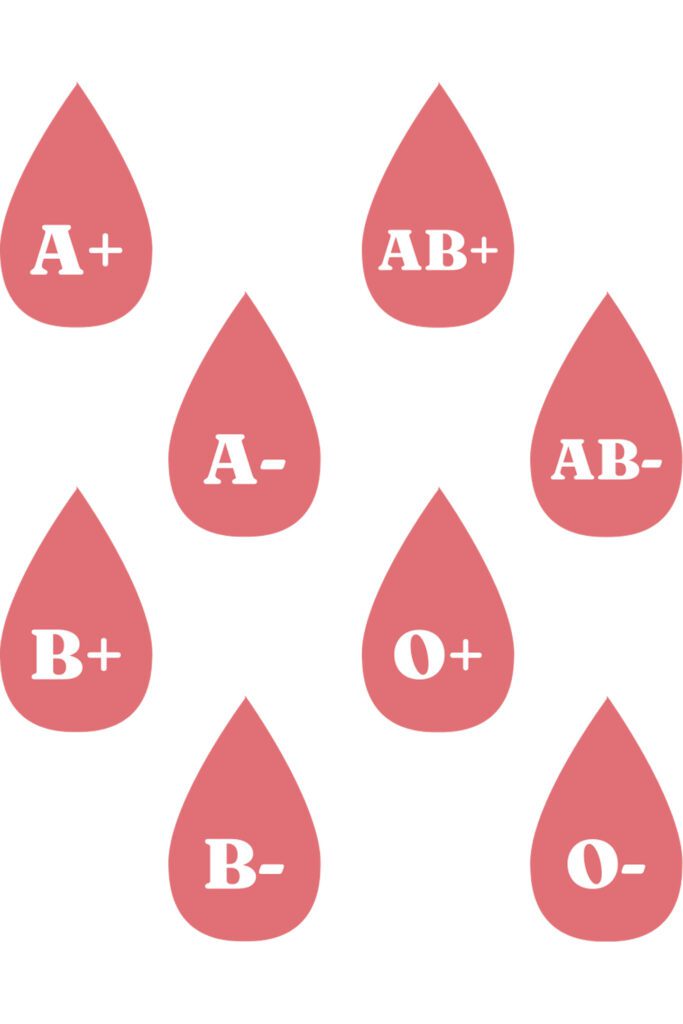While it’s important to know your blood type, sometimes the science of it all can be a bit overwhelming. Here, we’ve gathered some common questions about blood types and broken down the answers with experts who can tell you all about it.
How is blood type determined?
The traits that compose blood type are genetically inherited from your parents. Two elements determine blood type: the ABO group and the Rh factor. The four major ABO groups – A, B, AB, and O – reflect the presence or absence of A or B antigens in the blood, while the Rh factor (Rh+ or Rh-) reflects the presence or absence of a certain protein in the blood. The combination of these two factors leads to the eight most common blood types: A+, A-, B+, B-, O+, O-, AB+, and AB-.


Why is it important to know your blood type?
There are two key reasons that it’s important to know your blood type: transfusions and donations. “One of the most valuable reasons to know your blood type is to help others through blood donation,” says Mary Still, a physician assistant with Cempa Community Care. “Sometimes blood banks will put out a call for specific blood types, so when you hear that your type is in need, it’s your opportunity to roll up your sleeve and donate to help others.” Blood shortages are unfortunately not uncommon, but blood donations are needed regularly for all kinds of patients. “While we commonly associate the need for blood with traumatic injuries such as those suffered during traffic accidents or natural disasters, blood products are also used on a daily basis to support the care of patients undergoing routine surgical procedures or treatment for many common diseases like cancer, heart disease, and diabetes,” adds Karen Miller, the blood bank clinical coordinator for Erlanger Health System.
On the flip side of that, it’s always good to know your own blood type in case you’re the one in need of a transfusion. While medical staff will test your blood and determine compatible blood types for you should you need a transfusion, it’s helpful to know your own blood type simply as an added precaution in case you ever notice any kind of discrepancy. Outside of these two reasons, knowing your blood type can also help to prepare you for a potential pregnancy complication that can occur when the mother’s blood type is Rh- and the father’s is Rh+. This can lead to the mother’s blood creating antibodies that attack the baby’s blood, which can harm the child. Fortunately, this complication can be easily treated with proper prenatal care.



What kind of restrictions are in place for donating blood?
In the United States, there are some basic requirements that you must meet to be a blood donor. This includes being at least 16 or older (in most states), weighing 110 pounds or more, and generally being in good health. However, there are additional reasons why someone might be deferred, including feeling unwell on the day of donation, having low iron or hemoglobin levels, or having traveled to a country with a malaria risk designation in the past three years.
Other risk factors that might prevent you from donating are use of some prescription medications, recently getting a tattoo, or a history of engaging in behaviors such as IV drug use or sex work. “These questions are intended to minimize the risk that donated blood may harm the recipient rather than help,” explains Miller. “For example, during chemotherapy treatment for cancer, the recipient’s immune system will not be performing optimally. A minor cold that your immune system could fight might easily overwhelm someone undergoing chemotherapy.”








What does it mean to be a universal donor or recipient?
The terms “universal donor” and “universal recipient” are pretty self-explanatory. What isn’t self-explanatory is what makes certain blood types that way.
Antigens, which were mentioned previously as the factor that determines your blood’s ABO group, are also a major factor that determine your blood’s compatibility with other types. Type O blood contains no antigens – the protein in the blood that triggers an immune response – on the surface of the red blood cells. Type O- blood is considered to be the universal donor blood type due to its absence of antigens and the protein that determines the Rh factor. This means that red blood cells from O- blood can typically be transfused safely to any recipient. “This is especially important for trauma patients in the early moments of an emergency, as practitioners will often depend on O- blood to help save the person’s life,” adds Still.
On the other hand, the universal recipient blood type is AB+. AB+ blood contains both A and B antigens, meaning anyone with AB+ blood can receive a transfusion of red blood cells of any type. Though not quite a universal recipient, AB- blood can receive transfusions of any negative blood type. However, both blood types are somewhat uncommon.
Can having a rare blood type affect your life or health?
“This really depends on our definition of rare,” says Miller. For example, AB- is the rarest of the eight blood types in the United States. However, making up approximately 1% of the U.S. population still means that about 3 million people have that “rare” blood type. Furthermore, AB- is a universal recipient of negative-typed blood transfusions, as mentioned previously, so there often is no particular elevated risk for those with that blood type who are in need of a transfusion.
There are, in fact, rare blood types that are so rare, they don’t fall within the typical spectrum of blood types. This includes the Rh null blood group – a blood type that contains no Rh antigens on its red blood cells. Often referred to as “golden blood” due to its rarity and universal donor status, this blood type has been discovered in just dozens of people globally. “If by ‘rare,’ we mean something as rare as a type from this blood group, then yes, having this rare blood type could definitely have effects on a person’s life,” Miller adds. “Finding blood for such a person would be next to impossible.”



Does your blood type determine anything else about your health, such as nutritional needs or whether or not mosquitos are attracted to you?
Answers to questions regarding blood type and nutrition are still a work in progress. While some preliminary research has been done, “Currently there is not enough support evidence to validate the purported health benefits of blood type diets,” says Still. “If you are interested in pursuing a healthier lifestyle, I would recommend looking into a diet that emphasizes whole grains, vegetables, legumes, fruits, nuts, and seeds, such as the Mediterranean diet, which has more research and evidence behind it.”
As for the mosquito “myth,” there is actually more truth to the idea that mosquitoes may be more attracted to certain blood types than one might initially believe. Some research has shown that mosquitoes might be more attracted to O blood types than others; however, other factors might increase your attractiveness to mosquitoes as well, such as the scent of your sweat or if you’ve just had a beer. So, if you suspect that mosquitoes prefer you to your friends, it’s important to remember that while your blood type could be a factor, it’s likely to be a combination of things that draws them in.
If you don’t know your blood type, ask a provider the next time you’re in for bloodwork – it’s important information to have for more reasons than one.



Karen Miller, MT, ASCP
Blood Bank Clinical Coordinator, Erlanger Health System



Mary Still, PA-C, MMSc
Physician Assistant, Cempa Community Care

